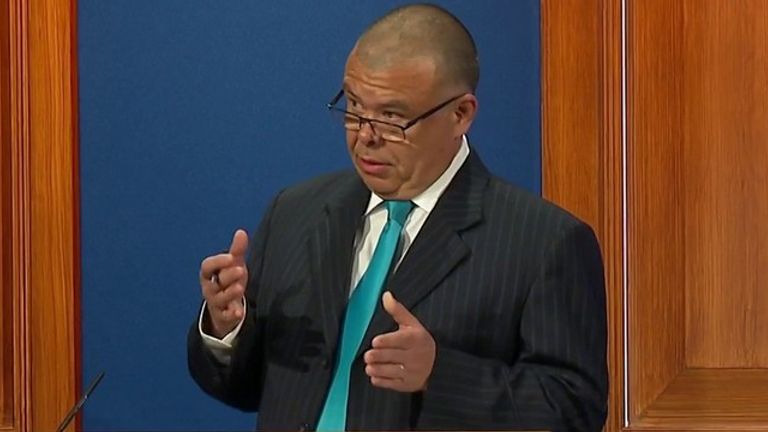Millions of people most vulnerable to COVID-19 are set to be offered a COVID booster vaccine from September to increase their protection ahead of winter.
New interim advice from the Joint Committee on Vaccination and Immunisation (JCVI) sets out the priority list for who should get a third jab if a booster programme is needed.
It said boosters should be given to 32 million Britons to prolong the protection currently provided by double jabs – and will be rolled out in a two stages alongside the annual flu vaccination programme.
Live COVID updates from the UK and around the world
Health Secretary Sajid Javid said: “Our first COVID-19 vaccination programme is restoring freedom in this country, and our booster programme will protect this freedom.
“We are working with the NHS to make sure we can rapidly deliver this programme to maintain protection for people in the winter months.”
He said the plan was designed to “keep the virus at bay” in winter, when restrictions should have fully eased.
The final JCVI advice will be published before September and will take into account the latest figures on coronavirus infections, as well as additional scientific data from trials and real-time surveillance of the effectiveness of the vaccines.
As most younger adults will receive their second COVID-19 vaccine dose in late summer, the benefits of booster vaccination in this group will be considered by the JCVI at a later time.
England’s deputy chief medical officer Professor Jonathan Van-Tam said: “Being able to manage COVID-19 with fewer or no restrictions is now heavily dependent on the continued success of the vaccination programme.
“We want to be on the front foot for COVID-19 booster vaccination to keep the probability of loss of vaccine protection due to waning immunity or variants as low as possible.
“Fewer or no restrictions will mean that other respiratory viruses, particularly flu, will make a comeback and quite possibly be an additional problem this winter, so we will need to ensure protection against flu as well as maintaining protection against COVID-19.”
The JCVI’s interim advice is that a third booster jab is offered to the following groups in two stages:
Stage 1
The following people should be offered a third dose COVID-19 booster vaccine and the annual influenza vaccine, as soon as possible from September 2021:
• Adults aged 16 years and over who are immunosuppressed
• Those living in residential care homes for older adults
• All adults aged 70 years or over
• Adults aged 16 years and over who are considered clinically extremely vulnerable
• Frontline health and social care workers
Stage 2
The following people should be offered a third COVID-19 booster vaccine as soon as practicable after Stage 1, with equal emphasis on deployment of the influenza vaccine where eligible:
• All adults aged 50 years and over
• All adults aged 16 – 49 years who are in an influenza or COVID-19 at-risk group as outlined in the Green Book
• Adult household contacts of immunosuppressed individuals
Tried and tested COVID jab strategy should work again
Analysis by Thomas Moore, science correspondent
It seems increasingly likely that people who are most vulnerable to serious disease will be given a booster dose of the vaccine in the autumn.
There is no evidence yet that immunity is dropping off – even those who were front of the queue for the current rollout still seem to be largely protected against the surge in infections caused by the Delta variant.
But there is no knowing where we will be in a few months’ time.
So the new advice from the government’s vaccines experts at the JCVI is a signal to the NHS to get ready, just in case.
It’s no surprise that the booster shots would be given to those at greatest risk first, either because of their age, occupation, or underlying health. It worked last time; it would work again.
But the JCVI isn’t yet clear on whether people should be given the same vaccine they had the first time round. A key study will reveal next month whether people get a stronger immune response if they are given a different type of jab.












